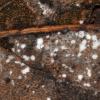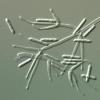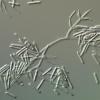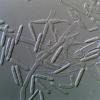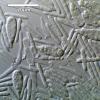
21-10-2015 00:47
Lepista ZacariasLichenicolous on DegeliaThis fungus was found grow

21-10-2015 12:57
Chris JohnsonBonjourThis was found on moorland peaty soil. The

20-10-2015 20:06
Marja PennanenHi,I collected yesterday Urceolella pani and notic

20-10-2015 18:17
 Zuzana Sochorová (Egertová)
Zuzana Sochorová (Egertová)
Hello,this Iodophanus grew on a dung of herbivore

19-10-2015 00:03
 Bometon Javier
Bometon Javier
Esporas 29-33 X 7-8 um, multigutuladas, septadas e

19-10-2015 00:39
Marja PennanenHello forum.these Hymenoscyphuslike grow on Picea

19-10-2015 22:41
 Bernard CLESSE
Bernard CLESSE
Bonsoir à tous,J'ai trouvé récemment cet asco e

19-10-2015 20:04
Please read the attached file Many thanks for hel
Hypocrealean anamorph?
Chris Yeates,
31-01-2018 03:49
 This fungus has appeared on one of a number of dead fallen Laurus nobilis leaves which have been kept damp.
This fungus has appeared on one of a number of dead fallen Laurus nobilis leaves which have been kept damp.The fungus in question forms small white discrete glistening patches on the underside of only one leaf from a dozen or so (so probably not a casual post-collection infection).
Hyphae are branched and bear verticillate narrowly ampulliform phialides with collarettes.
The conidia are not what I would have expected, being rod-like with 1 (occasionally 2) septa. The overall morphology makes one think of a Hypocrealean anamorph. The large conidia in the final image are those of Beltraniella pirozynskii.
Any thoughts very welcome.
Cordialement
Chris
Dartanha Soares,
31-01-2018 11:11

Re : Hypocrealean anamorph?
Hi Chris,
The closer I could get is Gliocladiopsis, however Gliocladiopsis has penicillate not verticillate conidiophores. Even though, I think it is a good place (name) to start.
All the best,
Dartanha
The closer I could get is Gliocladiopsis, however Gliocladiopsis has penicillate not verticillate conidiophores. Even though, I think it is a good place (name) to start.
All the best,
Dartanha
